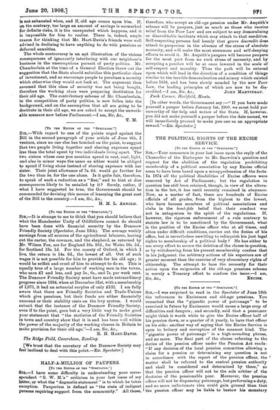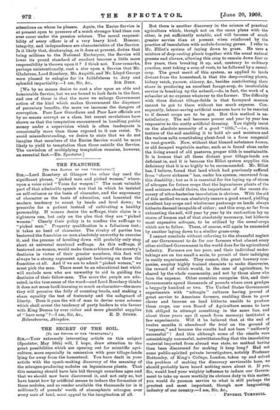[To THE EDITOR Or THE " SelscrATOR.1 SIR,—I was surprised
to read in the Spectator of June 13th the references to Excisemen and old-age pensions. You remarked that the "gigantic power of patronage" to be exercised in future by Excisemen would cause a large crop of difficulties and dangers ; and secondly, said that a pensioner might think it worth while to give the Excise officer half of his pension down, or a quarter of it yearly, to Lave that officer on his side : another way of saying that the Excise Service is open to bribery and corruption of the meanest kind. The "gigantic power of patronage" is a high-sounding phrase, and no more. The final part of the clause referring to the duties of the pension officer under the Pension Act reads : "If any decision of the local pension committee allowing a claim for a pension or determining any question is not in accordance with the report of the pension officer, the matter shall be referred to the central pension authority and shall be considered and determined by them," eo that the pension officer will not be the sole arbiter of the destinies of the pensionable poor. Moreover, the pensien officer will not be dispensing patronage, but performing a duty, and no more unfortunate idea could gain ground than that the pension officer may be liable to bestow his monetary
attentions on whom be pleases. Again, the Excise Service is at present open to pressure of a much stronger kind than can ever occur under the pension scheme. The moral responsi- bility of every officer is of a very heavy kind. Honour, integrity, and independence are characteristics of the Service. Is it likely that, discharging, as it does at present, duties that bring millions to the National Exchequer, the Service will lower its proud standard of conduct because a little more responsibility is thrown upon it ? I think not. Your remarks, perhaps unintentionally, cast a slur upon a, Service that Mr. Gladstone, Lord Rosebery, Mr. Asquith, and'Mr. Lloyd George were pleased to eulogise for its faithfulness to duty and splendid impartiality.—I am, Sir, &c., Ica DrEN.
[We by no means desire to cast a slur upon an able and honourable Service, but we are bound to look facts in the face, and one of these is that the more we enlarge Government action of the kind which makes Government the dispenser of pecuniary benefits, the more we increase the dangers of corruption. Poor Law Guardians and Poor Law officials are by no means corrupt as a class, but recent revelations have shown us that the temptation encountered in handling public money under a supervision which is often inadequate is occasionally more than those exposed to it can resist. To avoid misunderstanding, we desire to state that we do not imagine that members of the Excise Service would be more likely to yield to temptation than those outside the Service. The unwisdom of multiplying temptation remains, however, an essential fact.—En. Spectator.]











































 Previous page
Previous page